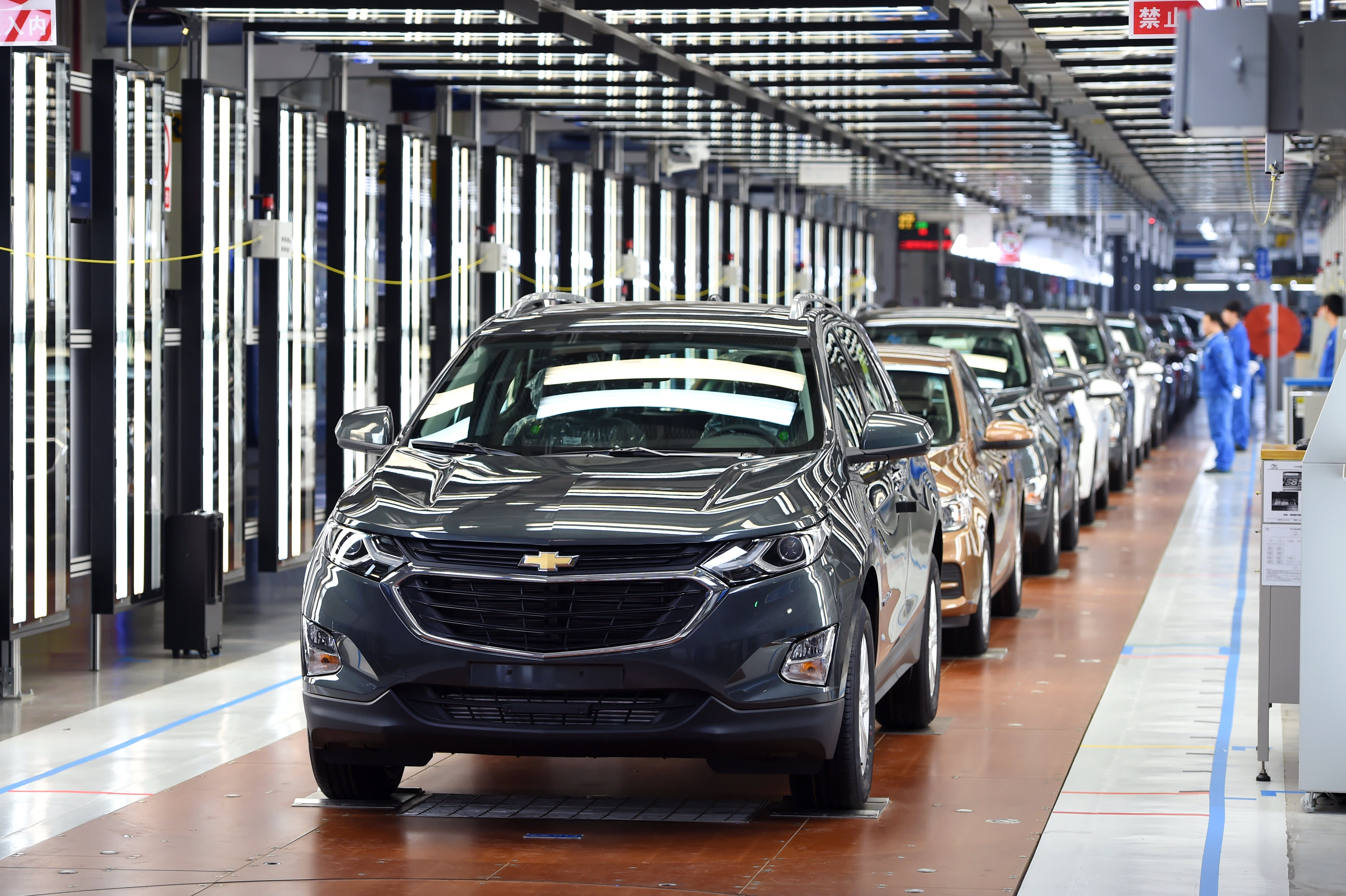A Chevrolet Equinox SUV is seen on the production line at SAIC-GM Wuhan Manufacturing Plant on April 7, 2017 in Wuhan, China.
VCG | Getty Images
The coronavirus extending factory shutdowns in China is the latest problem for increasingly “dangerous days” for the Detroit automakers in the world’s largest vehicle market.
General Motors last year saw its profits nearly cut in half, while Ford Motor and Fiat Chrysler were in the red amid substantial sales declines, a weakening economy and increased competition for European automakers as well as Tesla, which recently localized production of its Model 3 in China.
Executives for each of the automakers this week said the companies are continuing to monitor the situation and work on contingency plans, however, they declined to estimate potential losses from their China factories remaining shuttered due to the virus. They described the situation as “fluid,” “very concerning” and adding uncertainty to an already “volatile” Chinese market.
“We certainly are very concerned about the situation on an overall basis,” GM China President Matt Tsien said Thursday during an investor day for the automaker on Thursday.
The coronavirus, he said, “is likely to put further pressure on China’s economy,” leading to a larger near-term sales decline than expected for the year. GM had forecasted the Chinese market to be down by about 1 million vehicles to 24 million vehicles in 2020, which would be the third-consecutive year of declines.
China’s National Health Commission on Friday confirmed 31,131 cases of the deadly pneumonia-like virus in the country, with 636 deaths.
GM most at-risk
GM has the most to lose when it comes to the coronavirus impacting operations. It operates 15 assembly plants in the county with its Chinese partners. That compares to Ford with six assembly plants and Fiat Chrysler at two. The automakers also operate smaller supporting facilities.
The companies did not factor the impact of the coronavirus in their 2020 forecasts, all of which were relatively flat or down from last year.
“The coronavirus just introduces another dimension of complexity and risk for the Detroit automakers,” said Michael Dunne, CEO of ZoZoGo, which advises automakers doing business in China. The coronavirus, he said, “blindsided” the automakers and made them “hit pause” as they were attempting to mount rebounds in China.
China has extended a temporary factory shutdown through many provinces to help contain the epidemic. Many factories are expected to reopen as soon as next week, however the impact to the supply chain has already slowly started.
Fiat Chrysler on Thursday confirmed the coronavirus may force it to temporarily suspend production at one of its many plants in Europe. Hyundai Motor earlier this week said this it would idle all seven of its plants in South Korea because of a lack of parts from suppliers in China.
‘Dangerous days’
Dunne, prior to the coronavirus, warned it was “dangerous days” for the Detroit automakers in China, saying Ford and Fiat Chrysler are “losing fistfuls of money” and GM’s profitability is “sinking like a stone.” Ford and Fiat Chrysler are getting closer to breakeven, however, neither has said when they expect their operations in China to be profitable.
GM made about $1.1 billion last year in China, down from $2 billion a year earlier; Fiat Chrysler lost about $40 million in its Asia-Pacific region, led by vehicle shipments declining 29% in China; and Ford lost $771 million, roughly cutting its 2018 loss in half.
Fiat Chrysler CEO Mike Manley said the company is “not satisfied” with losing money in the region. GM CFO Dhivya Suryadevara said GM remains “bullish” on the long-term China market, describing it as a “maturing industry” with increased competition. Ford executives touted cost-cutting measures in China.
Credit Suisse’s Dan Levy said despite ongoing challenges for GM in China, the company is “coming at this from a much stronger position” than its largest crosstown rival, Ford.
“This is a much more challenging situation,” he told CNBC, adding Ford doesn’t yet have a clear path to profitability in China as it continues an $11 billion restructuring through the early-2020s.
The overarching issue last year for GM, according to Levy, is a “tough industry finally caught up to them” as well as some product challenges related to three-cylinder engines.
For Ford, he said, “it goes far beyond industry pressures.” In addition to market headwinds, he said it’s Ford’s “self-help actions,” including “cleaning up” its product portfolio, establishing a new local management team and creating better relations with its joint-venture partner.
“It’s all these factors that drove them to have a very significant loss that they’re now trying to recover from,” he said. “They’re just trying to ultimately get to breakeven or better … versus GM, which is still making money there, albeit at a reduced profit.”
Ford CEO Jim Hackett on Tuesday touted progress in China to investors, including the build-out of a new management team and starting localized production of the Lincoln Corsair, one of five new locally produced products planned for the country.
